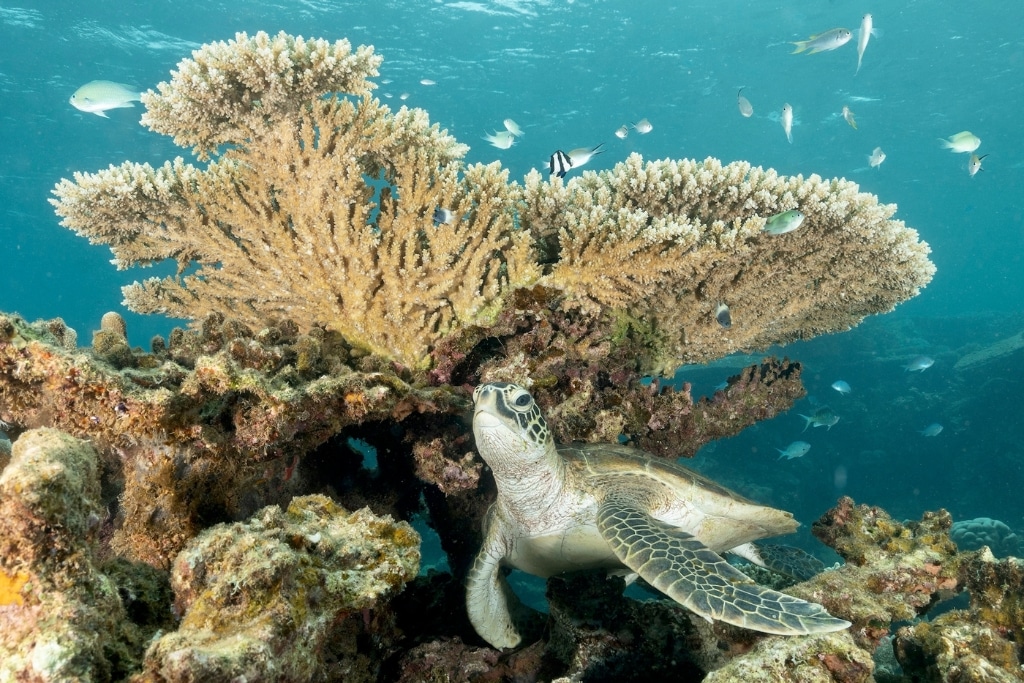Unless global warming is reversed, “extensive reefs as we know them will be lost,” warned new research on the planet’s tipping points.
—
The planet is grappling with a “new reality” as it approaches the first of a series of catastrophic and potentially irreversible climate tipping points: mass coral reef die-offs.
New research compiled by 160 scientists and published this week warns that we are rapidly approaching multiple Earth system tipping points. The Intergovernmental Panel on Climate Change (IPCC) defines tipping points as “critical thresholds in a system that, when exceeded, can lead to a significant change in the state of the system, often with an understanding that the change is irreversible.”
Rising global temperatures are heightening the probability of reaching dangerous tipping points in the climate system. Once crossed, they can trigger self-amplifying feedbacks that further increase global warming, such as thawing permafrost or massive forest dieback. Tipping points are also interconnected, meaning that once one collapses, the probability that others systems will be triggered increases.
With global warming having already surpassed 1.3C since the Industrial Revolution, one tipping point is now within reach. According to the report, we have pushed coral reefs beyond what they can cope with, and unless global warming is drastically curbed, “extensive reefs as we know them will be lost.”
Disappearing Ecosystems
Coral reefs are extremely important ecosystems that exist in more than 100 countries and territories and support at least 25% of marine species. They are integral to sustaining Earth’s vast and interconnected web of marine biodiversity and provide ecosystem services valued up to $9.9 trillion annually. They are sometimes referred to as “rainforests of the sea” for their ability to act as carbon sinks by absorbing the excess carbon dioxide in the water.
Unfortunately, reefs are disappearing at an alarming pace. According to the most recent report by the Global Coral Reef Monitoring Network (GCRMN), the world has lost approximately 14% of corals since 2009.
Acropora coral is highly vulnerable to bleaching, showing a lower tolerance for changes in water quality. Photo: Wikimedia Commons.
Since 2023, the world’s corals have been enduring the largest mass coral bleaching ever recorded, affecting 84% of reefs across at least 83 countries and territories. It is the fourth mass coral bleaching event ever recorded and the second in the last 10 years.
More to Come
According to the UN, current emissions reduction pledges put us on track for 2.6-3.1C of warming. Unless global warming is limited, we can expect more tipping points to be breached. These include the collapse of the West Antarctic and Greenland ice sheet, abrupt permafrost thaw and Amazon rainforest dieback.
Multiple studies suggest that the Atlantic Meridional Overturning Circulation (AMOC), a crucial system of global ocean currents that regulates heat distribution, is en route to a tipping point. This system ensures the oceans remain mixed and that heat and energy are evenly distributed, directly affecting the climate humans live in today.
The increase in freshwater inflows in the Atlantic Ocean from rapidly melting ice sheets and swelling rivers from global warming are pushing the system to the brink, with potentially catastrophic repercussions on global climate. Without this constant flow of AMOC, regional temperatures would become more extreme, with potentially severe cooling in the North Atlantic region and intense heat near the equator, making less land on Earth habitable.
More on the topic: What 2C of Warming Will Look Like: A Comprehensive Assessment
COP30
As the year’s most important international climate summit, COP30, approaches, the paper’s authors urged countries to do everything they can to minimize warming beyond 1.5C. This, they say, will require halving global greenhouse gas emissions by 2030 and reaching net zero by mid-century.
“If we wait to cross tipping points before we act, it will be too late,” they said.
More on the topic: What 2C of Warming Will Look Like: A Comprehensive Assessment
COP30 President André Aranha Correa do Lago said in the paper’s foreword that every tipping point represents an opportunity, as he urged countries to scale up solutions at the upcoming COP30 climate summit in Brazil.
“If coral reefs are dying back, restoration of coastal ecosystems can still drive resilience and livelihoods. If forests are at risk, their regeneration can unlock carbon removal, biodiversity recovery, and sustainable prosperity. If energy systems remain carbon-intensive, the exponential uptake of renewables and electrification — already led by many countries of the South — can define a new development model that cascades into positive change across other sectors,” he wrote.
Featured image: Serge Melesan.
Our non-profit newsroom provides climate coverage free of charge and advertising. Your one-off or monthly donations play a crucial role in supporting our operations, expanding our reach, and maintaining our editorial independence.
About EO | Mission Statement | Impact & Reach | Write for us

